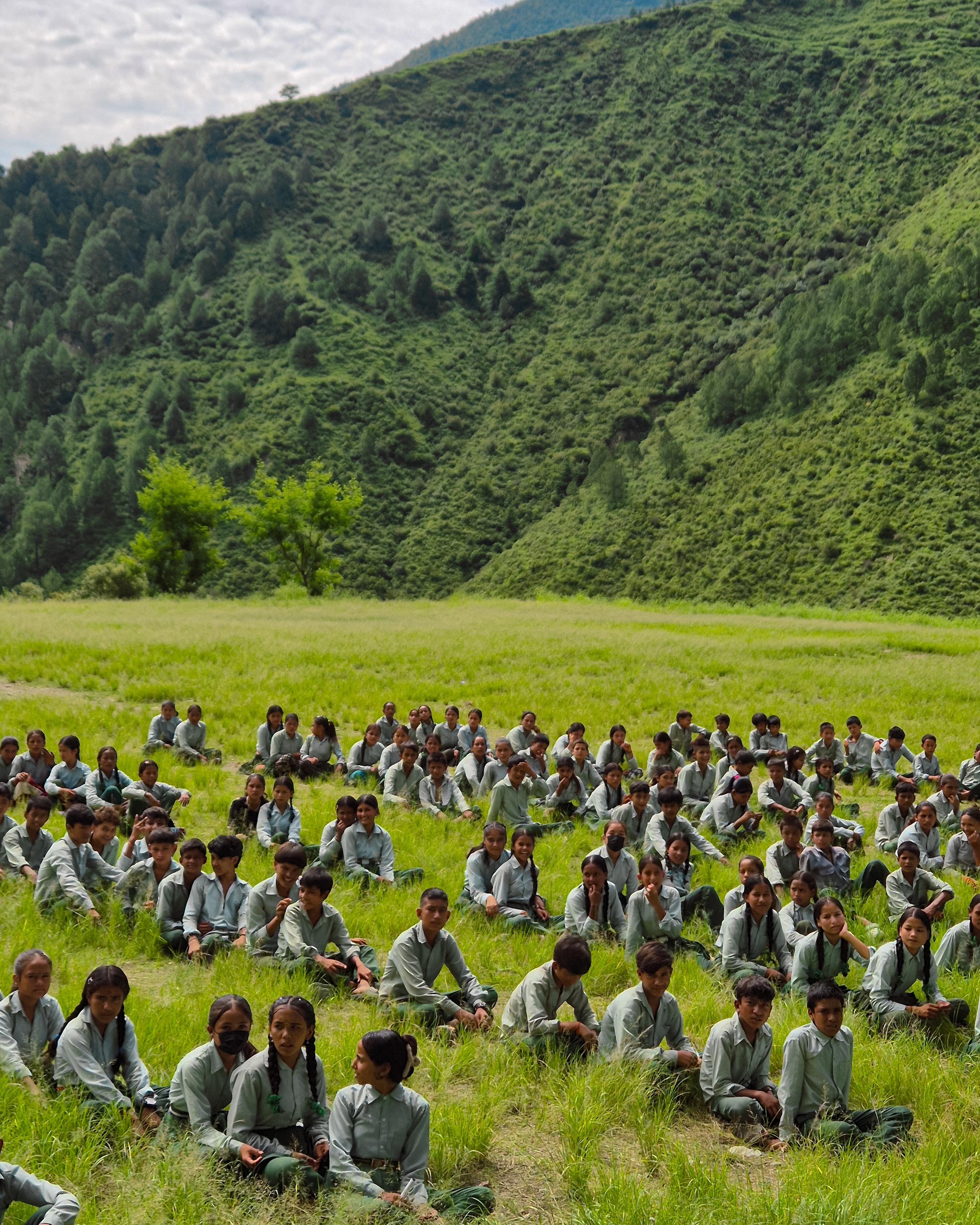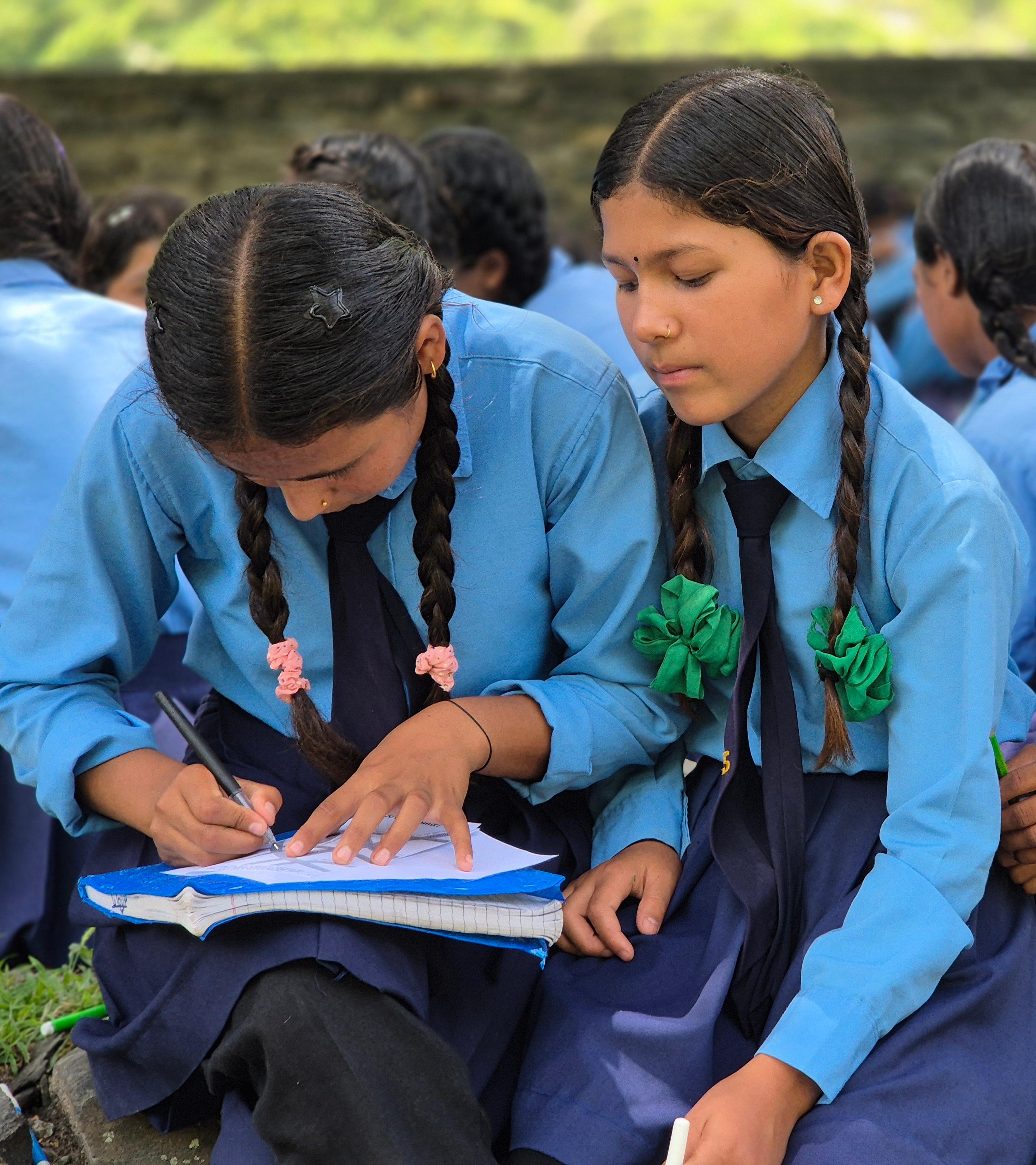



In the last week of August 2024, I was preparing for a journey that I knew would be different from any other—flying from Kathmandu to Nepalgunj, and then on to Bajura. Bajura, one of the most remote districts in Nepal, is a place where access to basic necessities, like healthcare and education, is still a daily struggle for many. The trip was part of Pyari’s mission to spread education about menstrual health, but as excited as I was for the work ahead, I couldn't shake off the nerves that accompanied me to the airport.
The night before the flight, I couldn’t help but do some quick Googling. I typed in “Bajura" and was immediately met with articles about its “dangerous airport" in Kolti. The next day at the domestic terminal in Kathmandu, I met Shreya Rokaya from Nepal Scouts: Girls Guide and Girls Association, who was leading the Back to My Roots campaign in collaboration with Pyari. Along with her were her sister Zoya and her aunt Liza. Soon after, Pyari’s operations manager, Srasta, arrived. We fondly call her operations momager because she takes care of all of us, keeping things organized and calm, even when we’re not!
As we boarded the plane to Nepalgunj, we were already anxious about the second flight to Bajura. Luckily, the plane landed smoothly in Nepalgunj, although it began raining right after we arrived in what is “the hottest city in Nepal”. That evening, while waiting for our next flight, we got to know our team and explored the lush plains of Terai, filled with green paddy fields and corn.
The following day, our flight to Bajura was repeatedly delayed. While we were waiting in Nepalgunj, we met several people from Bajura who were in poor health, making a difficult trip for urgent healthcare. Before I Even Reached Bajura, I Got a Glimpse of Life There. Life in Bajura is incredibly tough. As a very rural area, access to healthcare is extremely limited. There is only one hospital in Kolti–one of the villages in Bajura–and that too is lacking in doctors and nurses to meet the community's needs. Many people in critical condition have to travel to larger cities like Nepalgunj to get proper treatment. But the journey isn’t easy. The roads are rough and often unsafe, and air travel is unpredictable, especially during the monsoon season.
We finally took off from Nepalgunj around 2:30 p.m.The plane was small, with just two seats on one side and one on the other. Halfway through the flight, due to bad weather, we had to return to Nepalgunj, as the turbulence was rough. My dad's words, at the moment, “Shaili, don’t worry—small planes in Nepal are like tractors, small bumps are normal," kept me grounded. Thankfully, the next day’s weather was better. We were nervous about getting back on the same plane due to our previous experience; however, this time, the 35-minute flight from Nepalgunj to Bajura was smoother, and as the plane transitioned from plains to the greenest hills I’d ever seen, everyone cheered, “We’ve reached Bajura!"






At Kolti, Bajura’s airport, we were welcomed by Shreya’s family, who had walked an hour down from their village, Baddalla, to greet us with purple flower garlands. Shreya's sister-in-law mentioned, “Yesterday, we had yellow flowers that were much prettier, but you didn’t land yesterday." Honestly, the purple garlands were some of the most beautiful I'd ever seen.
Walking through Kolti Bazaar to our hotel, I was struck by the towering, lush hills surrounding the small village. The people, mostly elderly, stared at us newcomers. The women wore traditional scarves, big gold nose rings, heavy earrings, and colorful cholo-patuki, while the men wore daura suruwal and dhaka topis. Being in Far West Nepal for the first time made me realize just how far I was from home—everything felt different.
After arriving in Bajura, we immediately got to work. We went to the Bajura Municipality office to schedule and plan our events for the next few days. Representing Pyari, Srasta and I—the creative lead—had prepared a series of fun and educational activities for school visits and community sessions. Our focus was on opening up conversations about menstruation and raising awareness about menstrual health and hygiene. We knew it would be challenging, as people in Bajura still practice Chhaupadi—a tradition where menstruating women are isolated in separate huts, kept away from sunlight, and provided only minimal food, along with very little clothing for warmth. We were unsure how the community would respond to our sessions.
Over the five days, we visited local government schools and women’s communities in Budhinanda Municipality. We held sessions on menstrual health, introducing a variety of menstrual products available on the market, along with creative workshops and exercises designed for Bajura’s rural setting. We held drawing and writing activities, debunked myths related to menstruation, and conducted interactive Q&A sessions. Shreya led a reusable pad-making workshop, mostly with women aged 18-50, teaching them how to make and maintain these pads.
In most of the schools we visited, we held menstrual health sessions in rooms that fit about 50-60 students, with boys and girls sitting together. In rural areas like Bajura, menstrual health education is limited, and disposable pads are often the only product people know about. We introduced alternatives like tampons, menstrual cups, period underwear, and reusable cloth pads. The students, especially the boys, were curious and engaged, asking many questions, from menarche to menopause—“When do periods start?" and “At what age does bleeding stop?"
We also ran drawing activities, giving students a few minutes to express their thoughts about menstruation. They even wrote poems and reflections. After the sessions, students would come to us with more personal questions, like, “I get my period late—should I be worried?" and “I missed a month of periods once, but it became regular again—is that normal?" One boy asked if menopause could happen in your 20s because he was concerned about a family member.
Our team continued visiting schools and communities around Bajura, offering workshops, games, and even checking the sanitation facilities in the spaces. What struck me the most about the sessions was how seriously everyone listened. Normally, when we talk about menstruation with mixed groups, boys and girls tend to laugh or get shy, but not here. We saw how much menstruation impacts their daily lives, especially through the poetry they wrote during our poetry workshop, Bloodlines. Many students spoke about the ongoing effects of Chhaupadi and how it has impacted their families. Participants shared how their menstrual journeys have shaped them. The sessions were short but powerful—through their writing and art, we learned about deep personal stories, even in such a brief time.
While there, we saw Chau Goths—separate huts where menstruating women are isolated. Menstruation remains a taboo subject, but during our poetry workshop, both male and female students opened up through their writing. Many shared personal stories about Chhaupadi, how it affected their families, and even how it has led to deaths in their community. When we discussed the importance of having iron-rich foods during menstruation, students wrote about the continued practice of giving women limited food during their periods, touching upon how vulnerable the menstruators were in Bajura.
A big thank you to the people of Bajura for welcoming us so warmly and to the Pyari team for the opportunity. It was a life-changing experience, and while the beauty of Bajura is striking, it’s the stories of the people that will stay with me. Special thanks to Shreya for inviting us to be part of the Back to My Roots campaign—none of this would’ve been possible without you!



